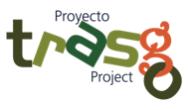A few years ago, the LabCAF group of the IGFAE proposed a new generation of cosmic ray detectors, called Trasgos, for the permanent study of cosmic rays by ground-based detectors. Unlike existing techniques, based mainly on the measurement of neutrons and muons, that devices offered, among other features, multi-particle capability, a software-based muon-electron separation and a rough electromagnetic calorimetry.
So far, four Trasgos have been built, dedicated to different research areas such as Solar Activity, Muography and Geomagnetic and Atmospheric studies. Now, a few smaller and more affordable Trasgos are currently being built with the aim of installing them in different Universities in different countries and networking them.
This meeting will review the current status of the Trasgo Project including the presentation and practical demonstration of the first miniTrasgo device.

